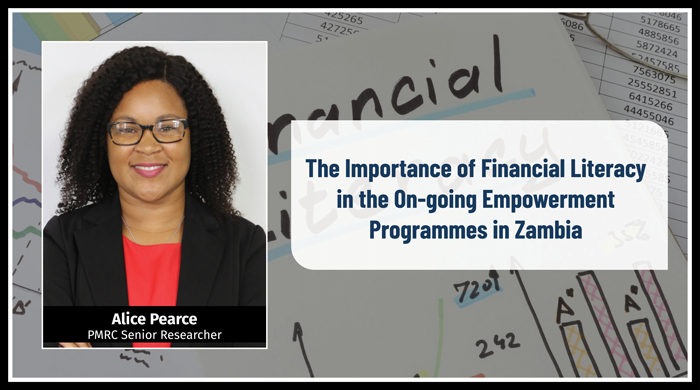By Alice Pearce – Senior Researcher at PMRC
In a bid to address the high unemployment levels in Zambia the Government has been implementing a number of empowerment programmes, particularly those under the Ministry of Youth, Sport and Arts, Ministry of Community Development and Social Welfare, the Department of Gender, Citizens Economic Empowerment Commission and more recently, the Ministry of Local Government and Rural Development, among others, targeted at supporting the economic empowerment drive of the women and youth. These programmes are aimed at fostering job creation and economic growth through entrepreneurship as a vehicle. These programmes also provide citizens opportunities to participate in the growth of the economy by accessing capital to invest in viable business ventures.
Although the empowerment programme initiative is commendable as it supports innovation and entrepreneurship which are the critical pillars for economic growth and social and economic inclusion, notable challenges have been observed in the effective management and accountability of empowerment funds to derive real economic benefit to the beneficiaries as well as the government at large.
Therefore, financial literacy has emerged as an essential pre-requisite for effective and efficient management of the funds accessed by beneficiaries venturing into businesses under the current empowerment programmes. Not only will enhancing the financial literacy of beneficiaries increase the sense of ownership within beneficiaries of the funds, it will equally enable them to fully take control of the opportunities available to them and guarantee their businesses to be self-sufficient. However, findings from the 2020 FinScope survey indicate that a significant amount of the population experience low financial capabilities with financial inclusion recorded at 71.2% for men and 67.9% for women. This has been attributed to low levels of financial literacy which is largely skewed towards the urban population at 31.9% and 16.2% among rural households. Hence, limited financial literacy remains a major barrier for the successful implementation of economic empowerment programmes in order to transform the economic outcomes of ordinary citizens.
It is crucial to note that empowerment should not only be about access to seed capital, it should rather focus on providing a comprehensive programme that is sustainable by giving more power to beneficiaries through education, information, coaching and counseling, as well as amplify the possibilities to get or create a job or business, access micro-credits and ICT networks in order to inculcate business values in the beneficiaries, particularly for those who are not typically familiar with running a profitable business. Further, enhancing relevant trade skills has the potential to make beneficiaries competitive in their respective fields in order to maximise profit margins. Hence, Government is urged to consider integrating these aspects into the current empowerment programmes.
Furthermore, there is need to create guidelines that clearly identify eligible candidates through a robust mechanism that seeks to provide tailored mentorship and training programmes of candidates to actualise their business proposals. At the onset of the empowerment programme, eligible beneficiaries should be taught financial literacy courses before fully embarking on their investments as this will form the basic foundation for the success of the programme. Similarly, building the capacity of candidates in requisite financial, negotiation, marketing and product development skills is necessary to effectively achieve the goals of empowerment programmes.
Moreover, enhanced financial literacy skills will enable beneficiaries to effectively track their expenditure and balance their income with expenditure which is critical for assessing the profitability of the venture. By embedding basic business management practices and principles into the current empowerment programmes will enable candidates to understand the basics of business management and develop their competencies to generate and sustain their income while improving the sustainability of the empowerment programmes, particularly in the case of revolving funds were beneficiaries need to pay back loans. Equally, for funds accessed as grants, beneficiaries need to account for the funds in order to achieve the goal of the programme that has a multiplier effect which should trickle down to improved quality of life of the beneficiaries and direct economic benefits within the community as well as the local economy.
In addition, when beneficiaries of empowerment programmes are financially literate, it can be expected that there will be a general motivation to access formal financial services in order to expand their businesses as they will be able to have balanced and well documented business transactions. Therefore, there is need to facilitate linkages between financial lending institutions and beneficiaries of empowerment programmes in order to improve financial inclusion through technical assistance that relevant financial service providers are able to give to the beneficiaries. This will also nurture the skill of saving and growing the savings of the business which is critical for the evolution of the business from one of empowerment to that of self-sustainability.




